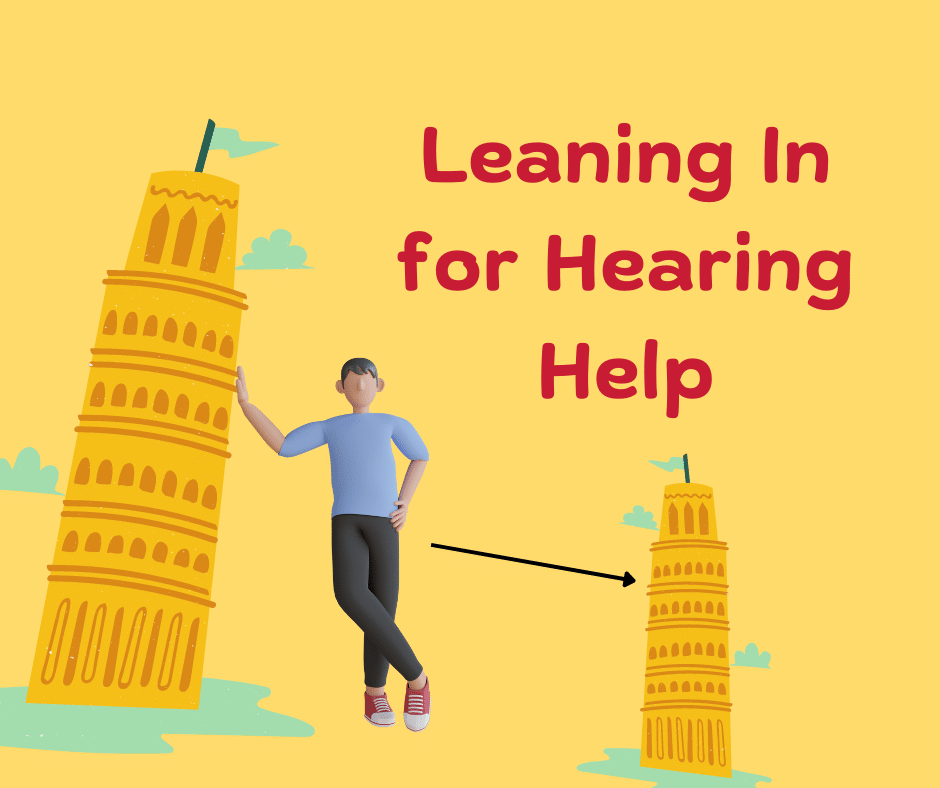Is this you?
You’ve done all you can to hear and understand in a difficult listening situation, especially one that involves several people chatting and talking over each other. You’ve positioned yourself in the optimal position. The other people know what you need but still, in the flurry of animated voices, speaking and responding, you’ve fallen behind.
There are several things you can do, but the first is usually to ask for help in the form of a repeat. You have a choice: you can ask the speaker to repeat themselves, or you can ask the person next to you, “What did they just say?” Or, if you’re really lost, “What are we talking about now?”
Of course, if you don’t want to ask for hearing help, you can choose to stay adrift, wearing a non-committal Mona Lisa smile and giving an occasional, thoughtful ‘deaf nod’. This is bluffing, a negative but favorite tactic of people with hearing loss. While in bluff mode, you hope nobody asks you a question, or that you’ll suddenly find everyone looking at you expectantly. Clearly, you’re supposed to respond but you have no freaking clue what’s going on, so you cough up, “Oh, I must have drifted off”, or more honestly, “I’m sorry, I wasn’t able to follow the conversation.”
Let’s go with the best option – asking for hearing help from somebody.
After decades of living with hearing loss, I’m not shy about asking for help. However, I also still bluff from time to time because I’m not perfect, just a typical person with hearing loss.
The people I regularly depend on to tell me what someone else has said, or to bring me up to date on topic changes, are my nearest and dearest humans. The Hearing Husband, my son, and my friends, both hearing and hard of. They know me and understand my issues and are happy to help me – just not always on my timeline.
When I ask for a repeat from the person talking, I’ve nailed them publicly and they must respond; otherwise, they’ll come across like a meanie. But if I ask one of the people I just mentioned, my request often interferes with how they are following the conversation, and they may pause me with a hand raised like a benediction, but which means, hold your horses for a few seconds. So, I wait, my eyes trained like lasers on the side of their head, until they turn and tell me what I want to know.
But sometimes, I need help with entire conversations, even if I don’t want it. Years ago, I was at the order window of a fast food drive-through with my son Joel, then eight or nine.
“Mpray uh paken udda, heesh?”
“Oh yes, hi…I’ll have one coffee with milk, one apple juice, and two fattening donuts, please.”
“Mprhhh?”
“Pardon me?”
“Mom, she’s saying….”
“Shh, honey, mommy’s trying to hear…. sorry, what was that again?”
“MM-PRHH!?”
“I’m sorry, I have hearing loss, I’m not quite getting…”
“MOM! She wants to know what size coffee you want!”
“OK, Joel, don’t yell, I’m not deaf…uh, a medium coffee, please.”
“Cattle-bees whore-hollers en finny sense. Prst inno, heesh.”
Giving up, I look pleadingly at my young son, who’s been through this before.
“Mom, she says that’ll be four dollars and fifty cents. Drive to the first window.”
“OK, OK, I know where to go, son, I have done this before.”
I must have been having a grumpy day, or I was embarrassed at having my son interpret for me. Twenty years later, I now get the Hearing Husband to make such orders and my son instinctively knows when I need hearing help. I’m grateful to them and anyone who cares enough to help me communicate.
Communication is a two-way street, but it’s also a group event. Lean in and ask for the help you need – because there’s no shame in it.
 Note from Gael: This blog is my approximately 600th article for HearingHealthMatters! Help me celebrate these 13 years and sign up for our weekly newsletter which contains articles of interest and importance to people who care about hearing health. If you have signed up before and are not receiving the newsletter, please sign up again as there have been website changes (and don’t forget to check your spam). Thank you for reading!
Note from Gael: This blog is my approximately 600th article for HearingHealthMatters! Help me celebrate these 13 years and sign up for our weekly newsletter which contains articles of interest and importance to people who care about hearing health. If you have signed up before and are not receiving the newsletter, please sign up again as there have been website changes (and don’t forget to check your spam). Thank you for reading!






